CEC ArtsLink advocates and supports transnational cultural mobility and collaboration, empowering artists and arts leaders to engage communities in dialogue and creative projects for a more equitable, compassionate, and sustainable world. We resolutely embrace inclusivity, independent expression, human rights, and the development of civil societies.
CEC ArtsLink supports dialogue between artists and communities through individual encounters, public events, transnational networks, and virtual platforms. Founded in 1962, CEC ArtsLink believed that it was essential for citizens of the United States and the Soviet Union to meet and build mutual trust, while their governments engaged in the Cold War. Today, artists and arts leaders play a vital role in nurturing civil societies. Through the simple act of bringing people together in a shared experience, through exploration of the unfamiliar, art can dissolve borders and help communities overcome distrust and insularity. As nations increasingly retreat behind their borders, it becomes imperative for the work of artists and arts leaders to catalyze communities in mitigating conflict and prejudice locally, nationally, and globally.
60 years of leadership in cultural diplomacy
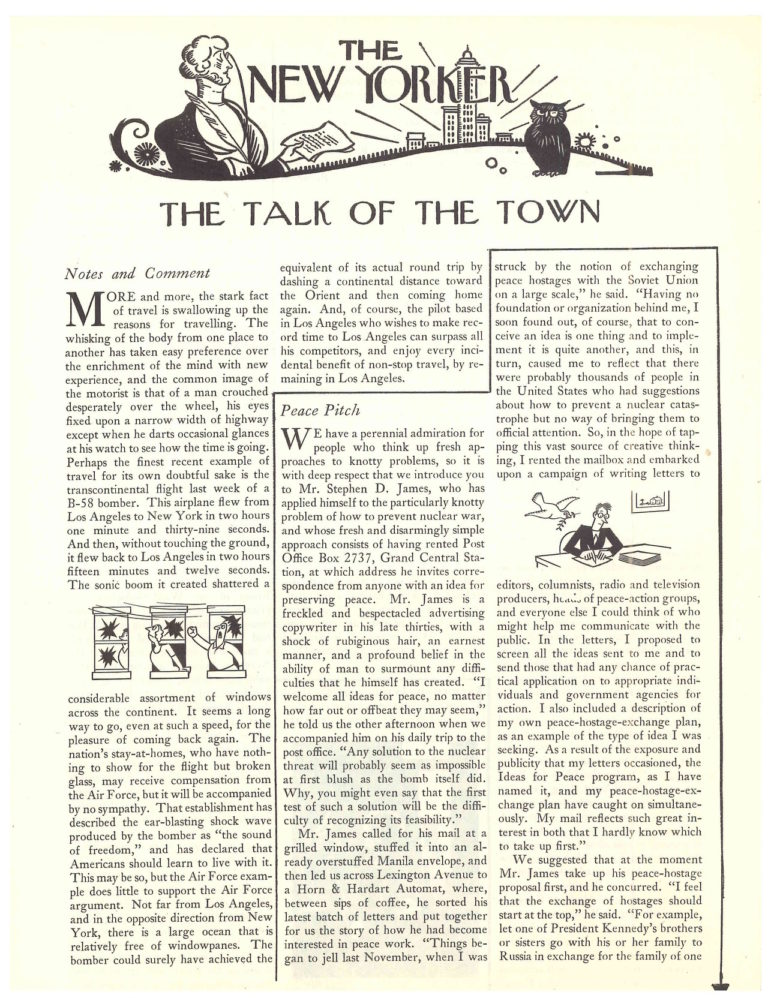
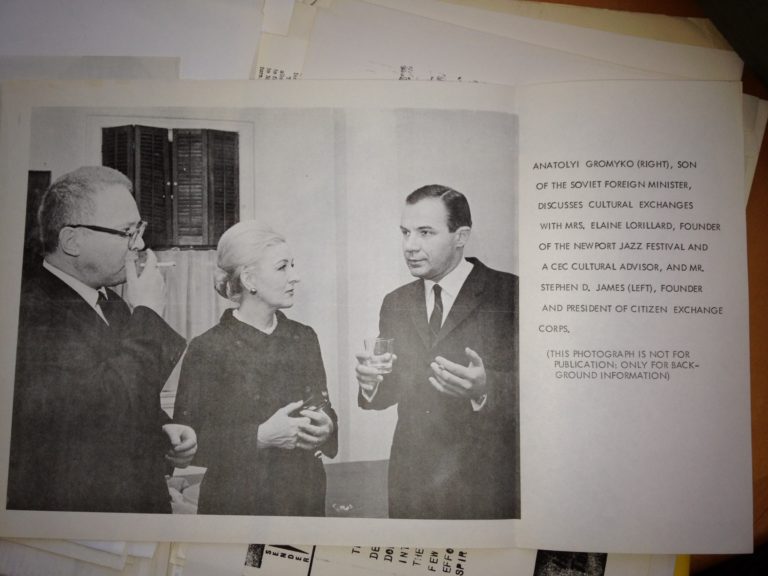
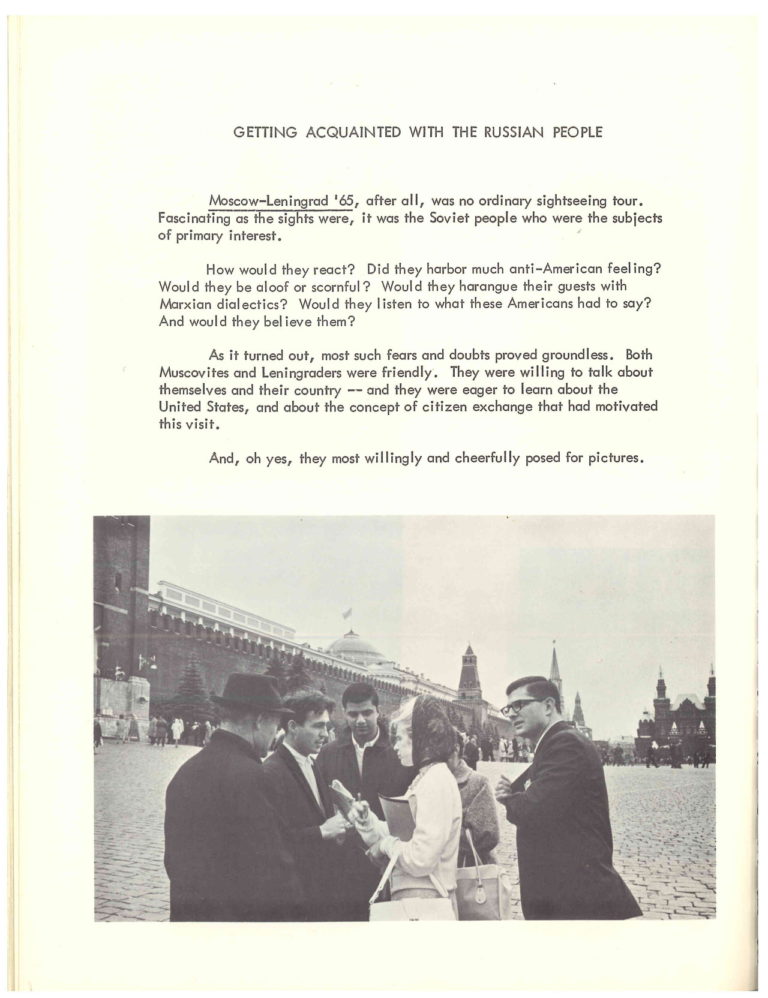
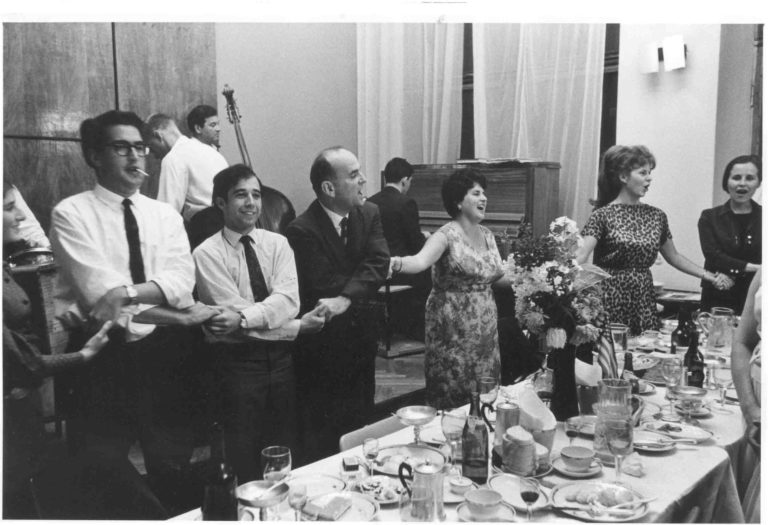
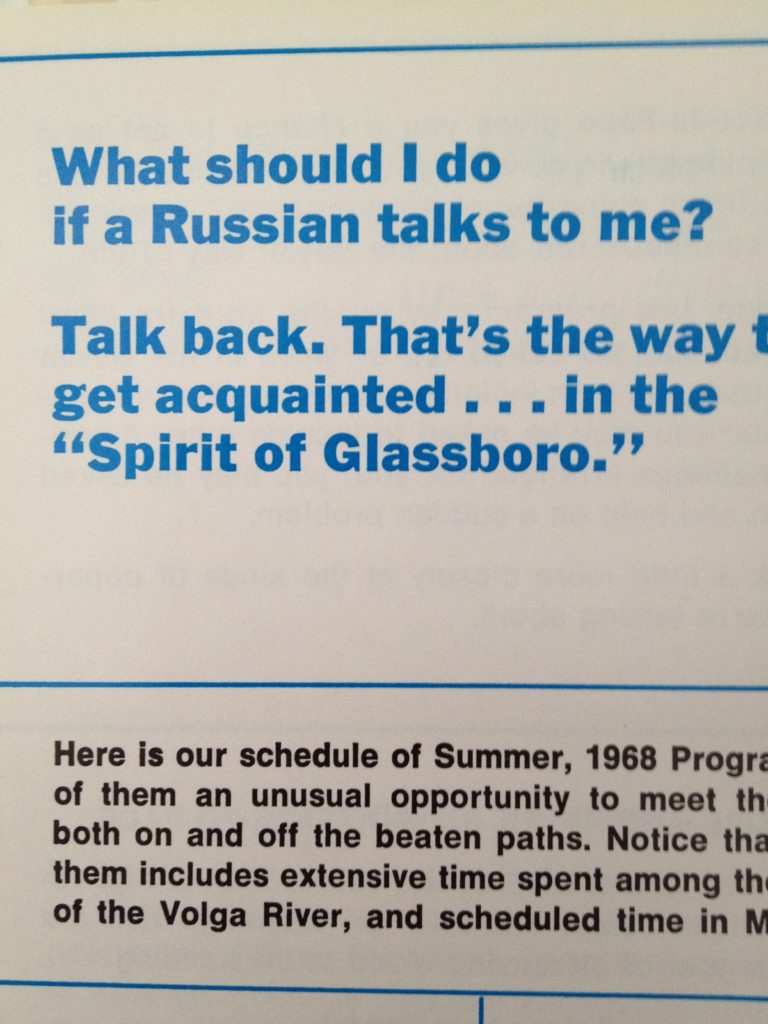
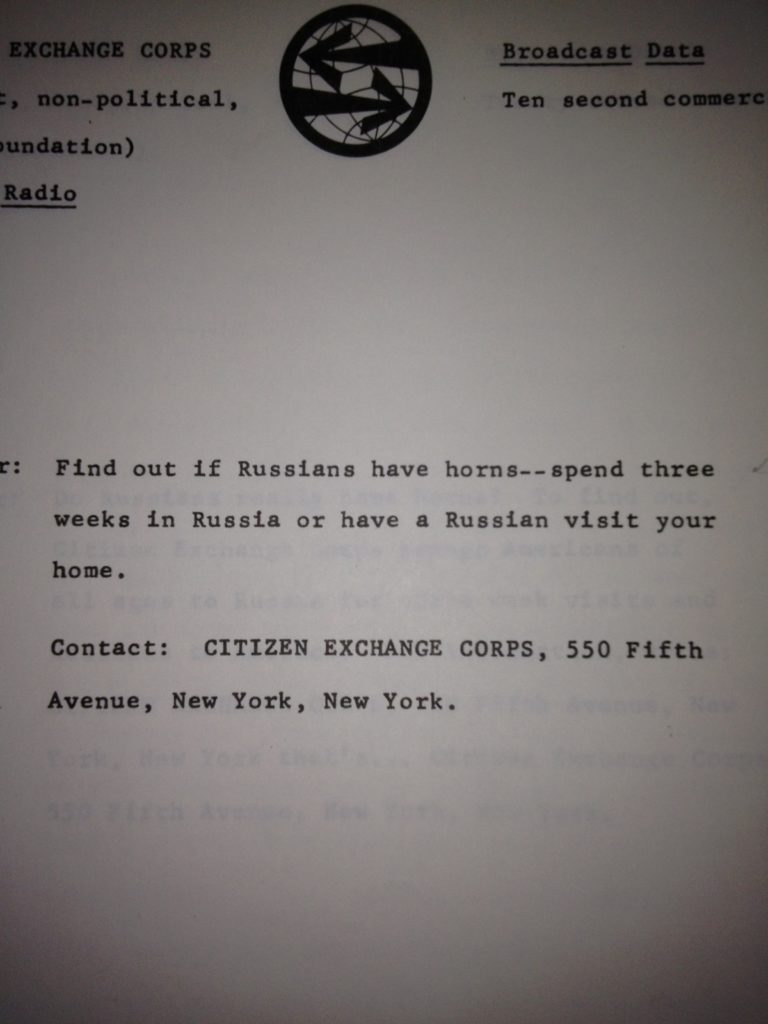
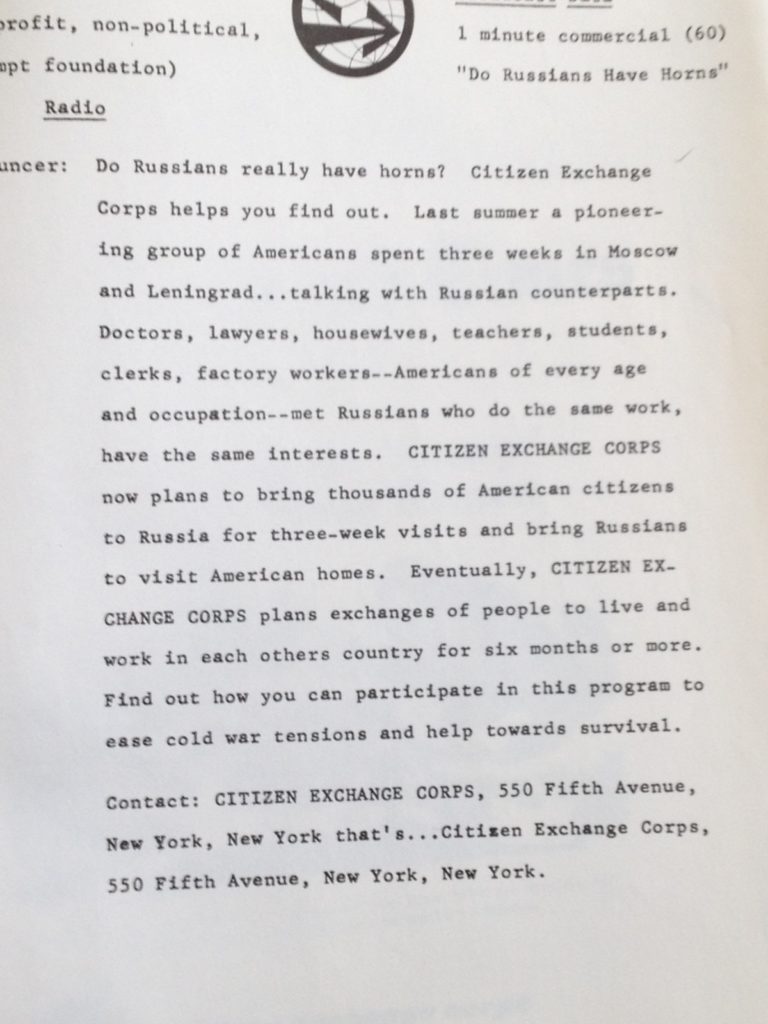
CEC founded: peace hostages against MAD
Stephen Dan James quits his Madison Avenue advertising job to devote himself to preventing nuclear war. He founds Peace Hostage Foundation with a mission to make the policy of nuclear mutually assured destruction (MAD) unnecessary by instituting the practice of exchanging prominent citizens between hostile states. 750 individuals volunteer to be hostages for peace.
In 1964, the USSR Peace Committee receives 4 representatives of Peace Hostage Foundation in Moscow to discuss receiving a group of Americans.
A year later, 144 Americans visit Moscow and Leningrad. James is disappointed: he had anticipated 8,000. The Foundation’s name is changed to Citizen Exchange Corps (CEC), inspired by Peace Corps.
In 1966, CEC organizes visits to the USSR for 500 Americans exceeding the year’s total for official governmental, educational, and religious groups.
The 28 member Sarah Lawrence College European Choir visit Moscow, Kiev and Leningrad in 1968. The Boston Herald editorially commends CEC’s efforts: “…the more the people of each land know of the interests, attitudes and aspirations of the other, the greater will be the chance of a constructive, peaceful relationship.”
“CEC is a small candle of hope…. The world deserves nothing less.”
1970-71: Led by Ms. Billie T. Davis groups of students from Booker T. Washington High School in Atlanta visit the USSR under CEC’s sponsorship. Ebony magazine and “Sixty Minutes” feature the story. NY Senator Jacob Javits praises CEC in a letter entered into the Congressional Record: “CEC is a small candle of hope…. The world deserves nothing less.”
CEC sponsors an exhibit of US and Soviet Children’s Art at the Metropolitan Museum and at other venues around the US, which is featured in Life magazine.
CEC explores the possibility of exchanges with China, Ghana, and Central European countries.
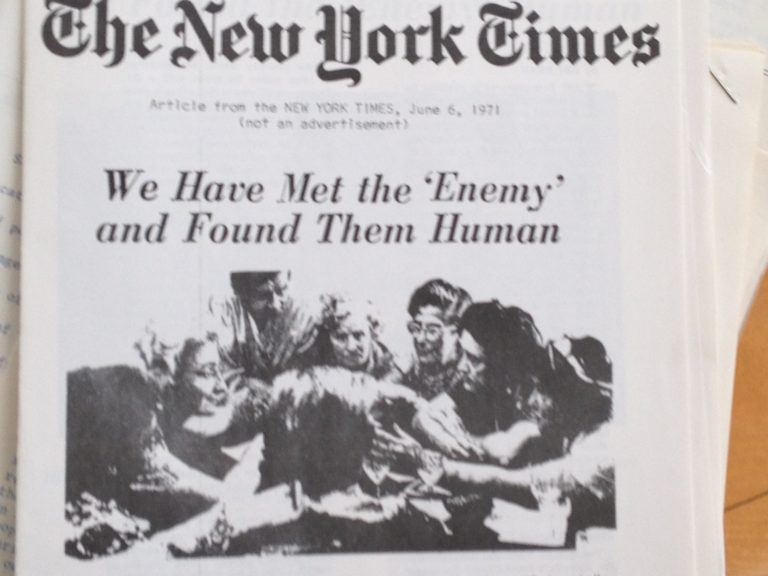
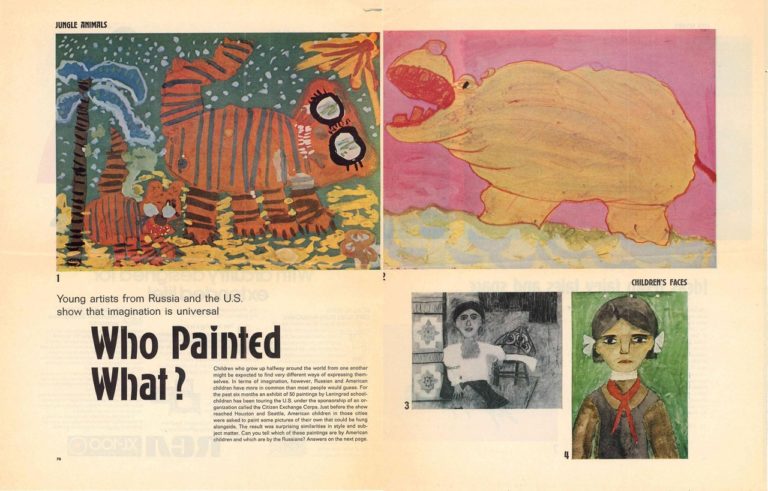
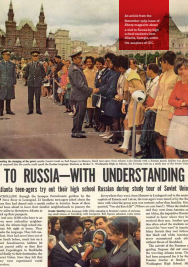
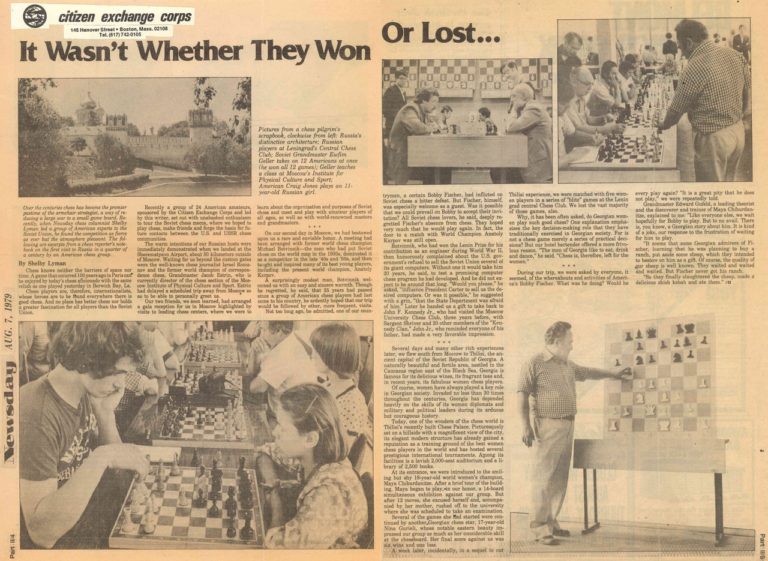
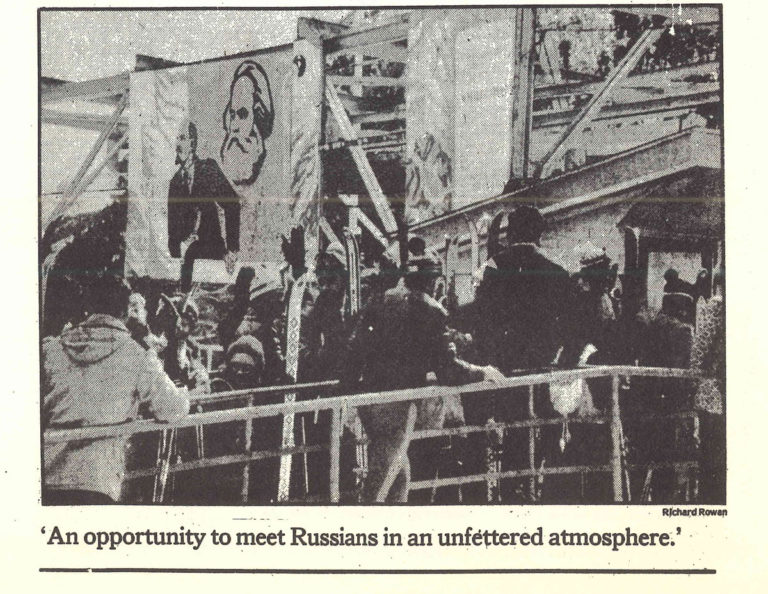
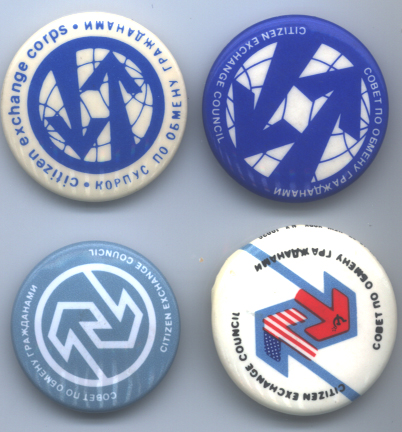
“The more the people of each land know of the interests, attitudes and aspirations of the other, the greater will be the chance of a constructive, peaceful relationship.”
Stephen James resigns in 1974, Dr. C. Grant Pendill, Jr., Soviet affairs specialist, becomes CEC’s new president.
CEC organizes visits to the USSR for chess enthusiasts and for skiers who visit the Caucasus.
Volga River cruises for US citizens together with Soviet citizens attract many participants. The Soviet international tourist agency Intourist insists on separate cruises for foreigners in the future.
New travel programs for students and photographers
CEC is reorganized under the leadership of Dr. Michael Brainerd and renamed Citizen Exchange Council.
CEC continues its program despite the Intourist policy. After the boycotted Olympics in Moscow, interest in travel to the USSR revives, and CEC carries out a tour to Siberia and Mongolia for 30 people.
In 1982, CEC announces large number of new travel programs for high school and college students, as well as one for photographers — previously too sensitive for Soviet authorities.
In 1985, CEC with Cornell Capa, Director of the International Center of Photography, and well known Soviet photojournalist D.N. Baltermants organize a traveling exhibit, Soviet Photography of WW II: 1941-1945.
Yale University students approach CEC with a proposal for exchanges with Moscow University.
CEC conducts a tour of Russia and the Caucasus for 93 members of the faculty and staff of Phillips Andover Academy.
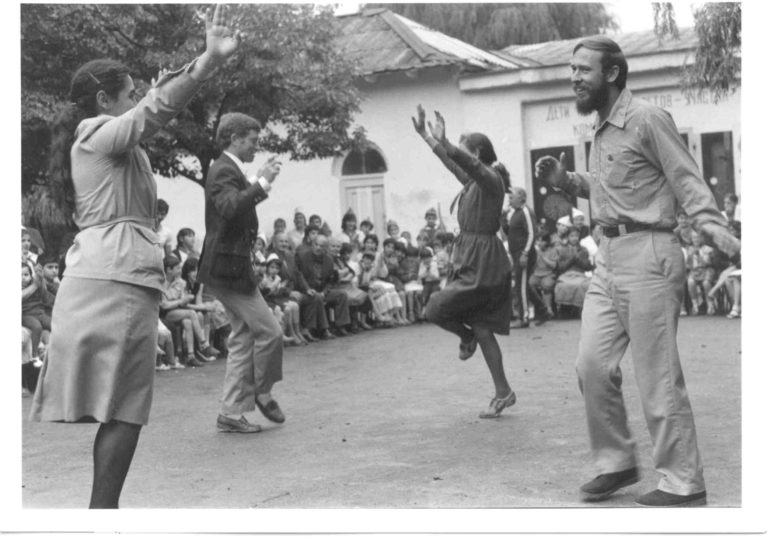
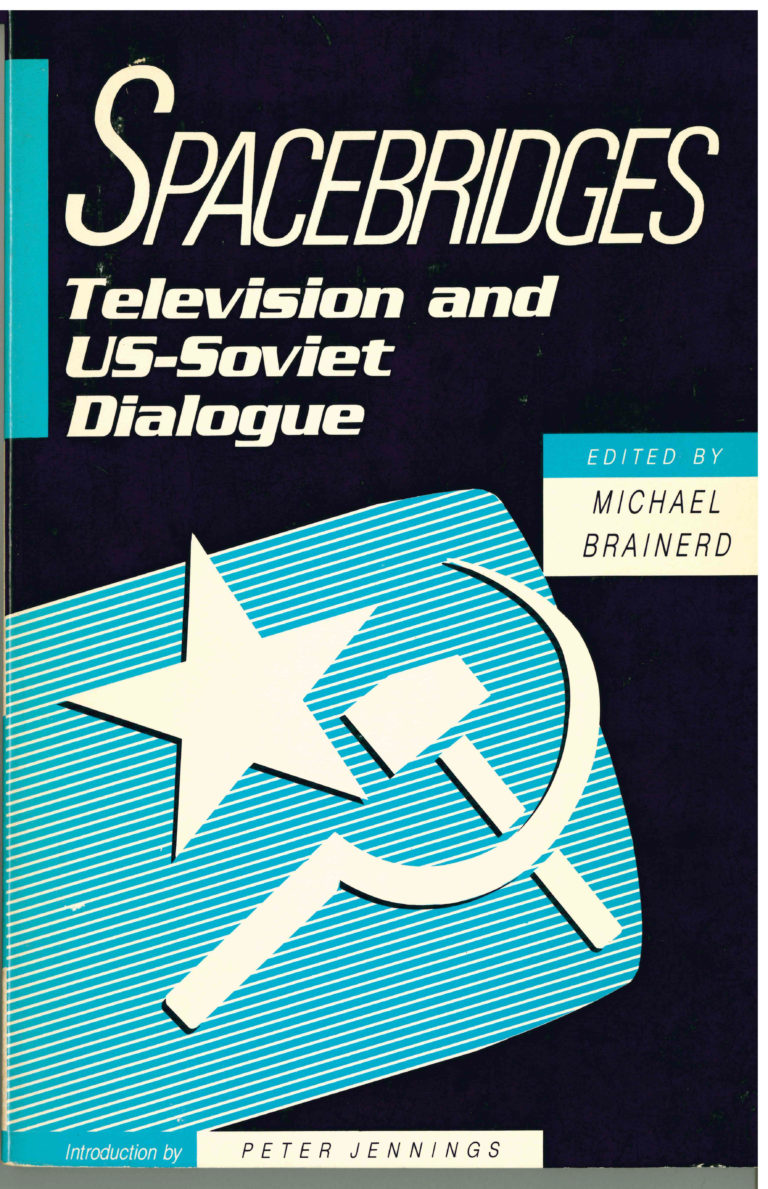
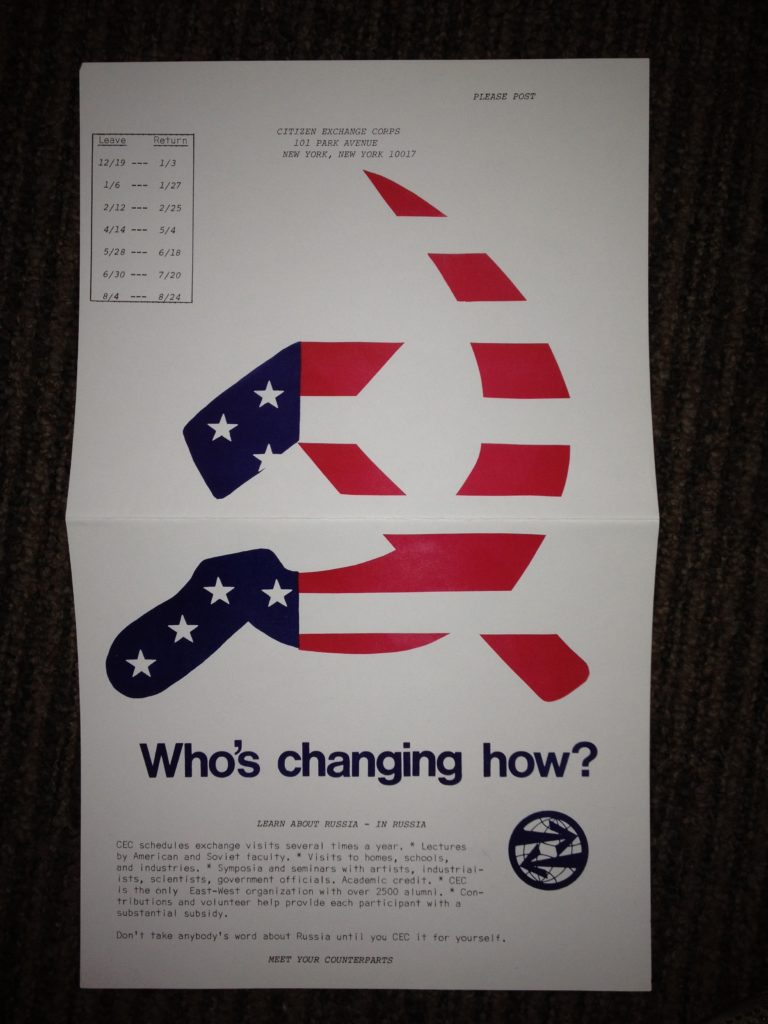
Space Bridges and mosh pits during the first years of the "perestroika" and "glasnost"
In 1986, The Yale-Moscow University exchange becomes a model for the University Pairing Program, working with Soviet Ministry of Higher Education to create the first direct undergraduate student exchange between US and Russian universities. CEC’s board discusses altering one of the organizations central positions: to have minimal contact with the US government, in order to be seen in the USSR as a truly non-governmental organization.
CEC conducts two conferences on “Space-Bridging”, the two-way TV audience-participation events hosted by Phil Donahue and Vladimir Posner, in 1987.
CEC provides expertise and logistics for entertainer Billy Joel’s concerts in Moscow and Leningrad where the “mosh pit” becomes a learning experience for Soviet presenters and security personnel.
CEC assists with the American-Soviet Youth Orchestra’s first concert.
The Glasnost Film Festival in the US and the American Documentary Showcase in the USSR
CEC produces the Glasnost Film Festival that brings 22 films and 11 Soviet directors to US university campuses in a 6-week tour.
The organization’s new name, CEC International Partners, is chosen to reflect the theme of cooperation.
Ninth-graders from Hilton Head Preparatory School, participating in a CEC environmental program, witness the anti-Soviet revolt in Vilnius, Lithuania.
CEC produces American Documentary Showcase in the USSR, a month-long tour of Russia and the Caucasus by 24 American film-makers. Such features as “Harvey Milk” and an episode of the civil rights movement PBS series “Eyes On the Prize” astound Soviet audiences.
CEC closes the University Pairing Program in the face of chaos in the USSR and creates a program of environmental education exchanges River-to-River which pairs secondary schools in Rostov-on-Don and the Tennessee Valley.
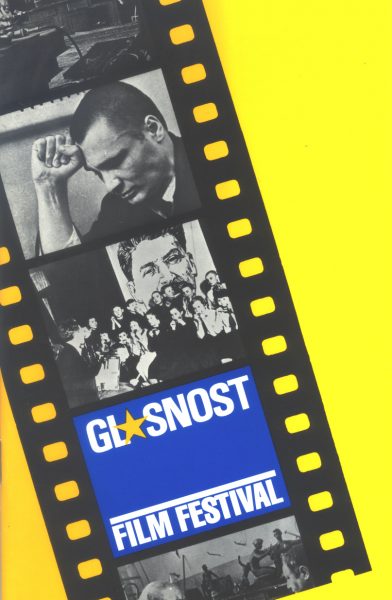
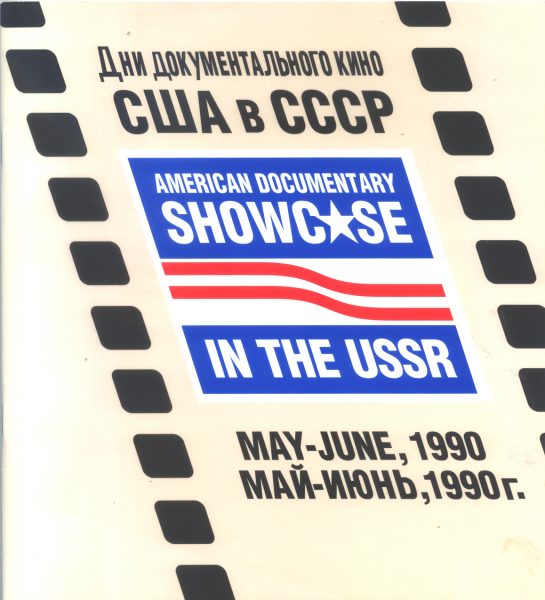
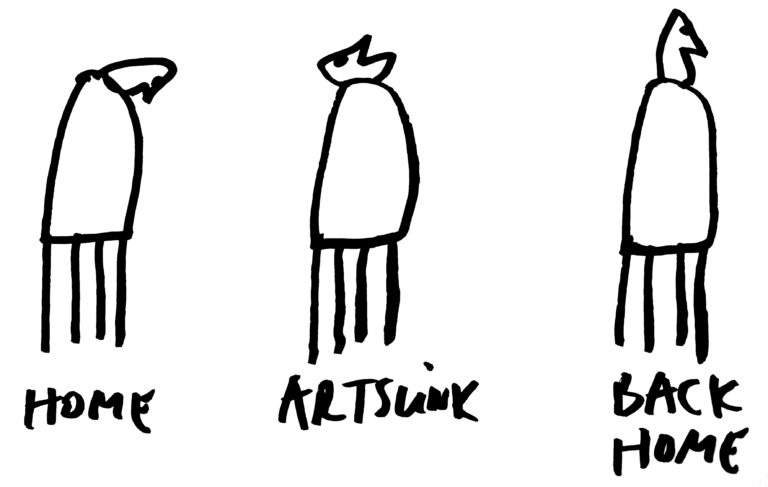
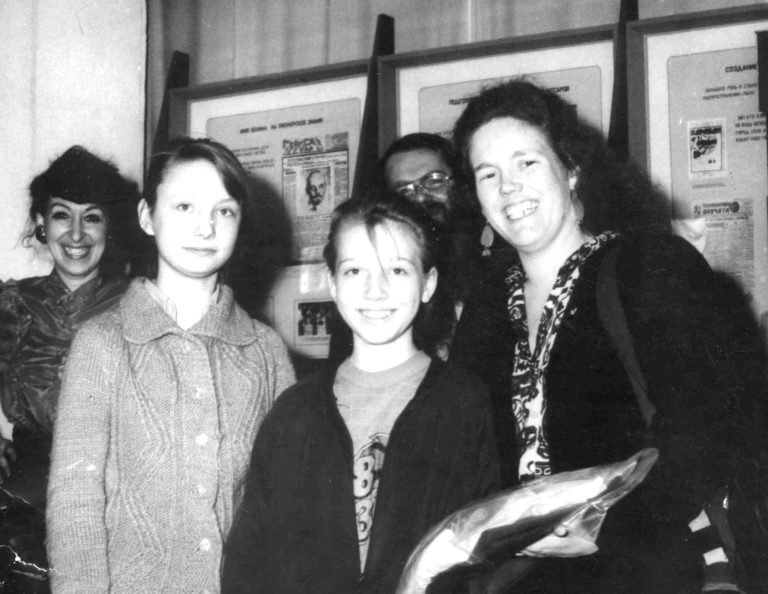
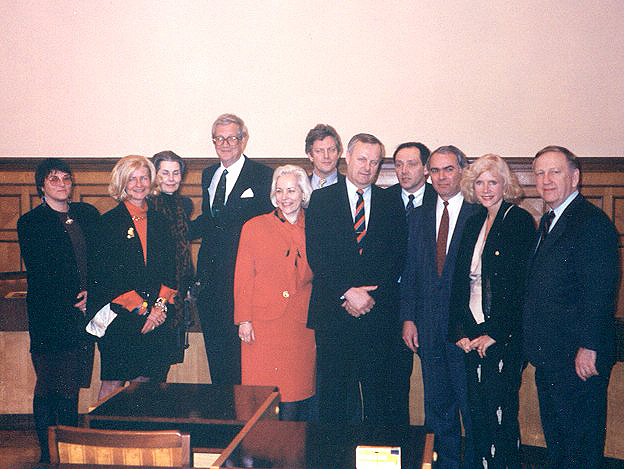
New focus on the arts and environment: ArtsLink, EcoBridge and St. Petersburg 2003
In 1992, CEC inaugurates ArtsLink Awards, an exchange of artists from the newly independent countries of former USSR and East/Central Europe. ArtsLink is a partnership of CEC International Partners, the National Endowment for the Arts, the Soros Centers for the Contemporary Arts, and the Trust for Mutual Understanding.
CEC brings several American scholars and musicians to Moscow for the Scriabin Festival and co-sponsors “Artists as Social Innovators”, a symposium on the role of contemporary artists.
CEC “un-links” its programs from the US – former Soviet Bloc political relations and focuses on the arts and environment. Its geographical scope grows to encompass not only the former USSR, but also the former communist countries of Central and Southeastern Europe.
In 1993, CEC creates St. Petersburg 2003 program to help cultural institutions in the former Leningrad modernize and prepare for the 300th anniversary of the city’s founding. American Committee for St. Petersburg 2003, a consortium of US organizations interested in cultural projects in St. Petersburg, is chaired by Ambassador William H. Luers.
New environmental education program EcoBridge supports exchanges for 390 high school students from Russia and the US.
Les Noces, "Along the Frontier", and Peter the Great's first sailing boat
The Nijinska Dance Project, co-organized by CEC, brings the legendary Bronislava Nijinska ballet Les Noces to Russia.
In St. Petersburg, CEC facilitates Along the Frontier, a United States Informantion Agency’s traveling show of work by US contemporary artists Ann Hamilton, Bruce Nauman, Francesco Torres, and Bill Viola.
River-to-River Teacher Training Seminar meets in Rostov to evaluate exchanges and develop curricula.
School Linkages program places 88 Russian students, teachers, and educators in residencies in US communities.
CEC helps bring and restore Peter the Great’s first sailing boat in NYC at the World Financial Center’s festival St. Petersburg: A Cultural Celebration.
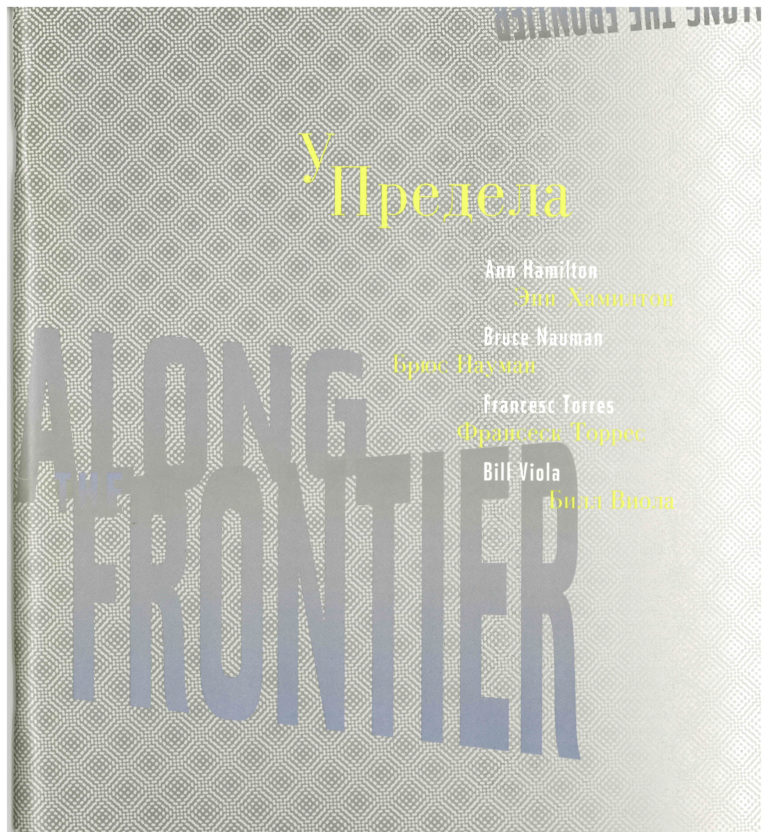
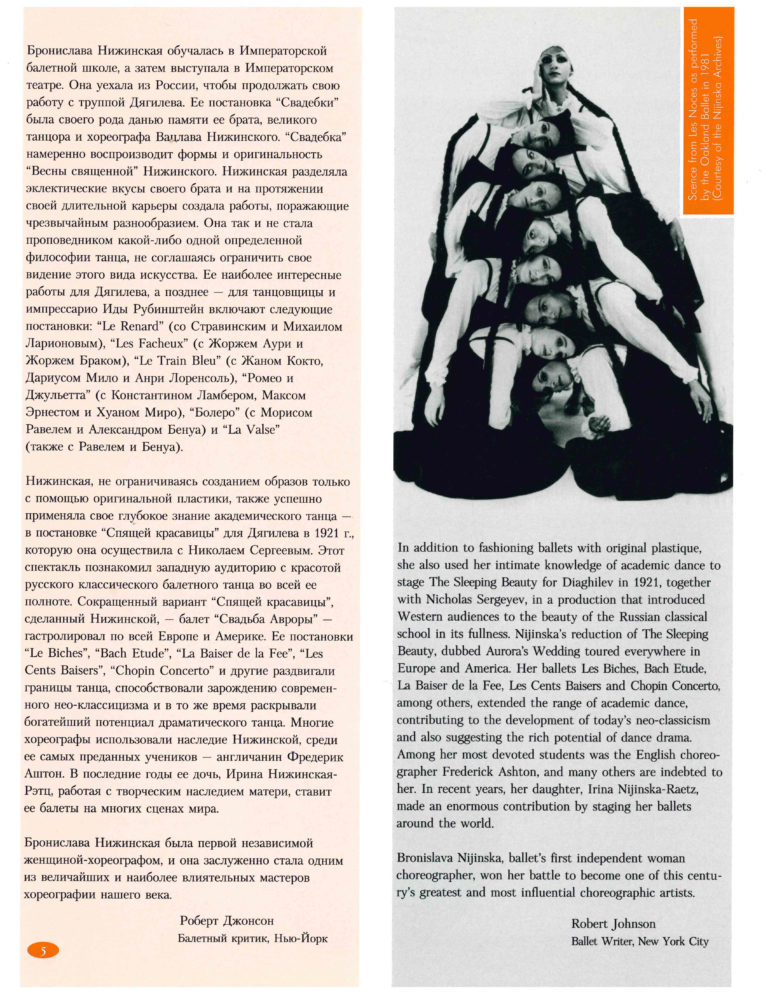
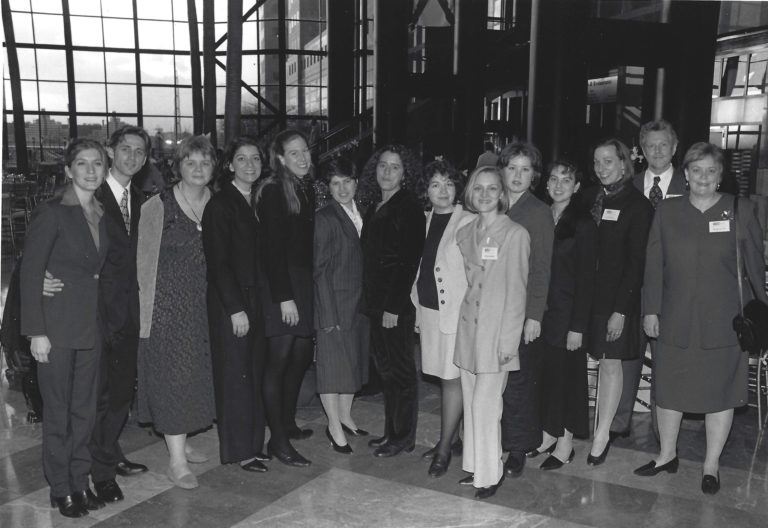
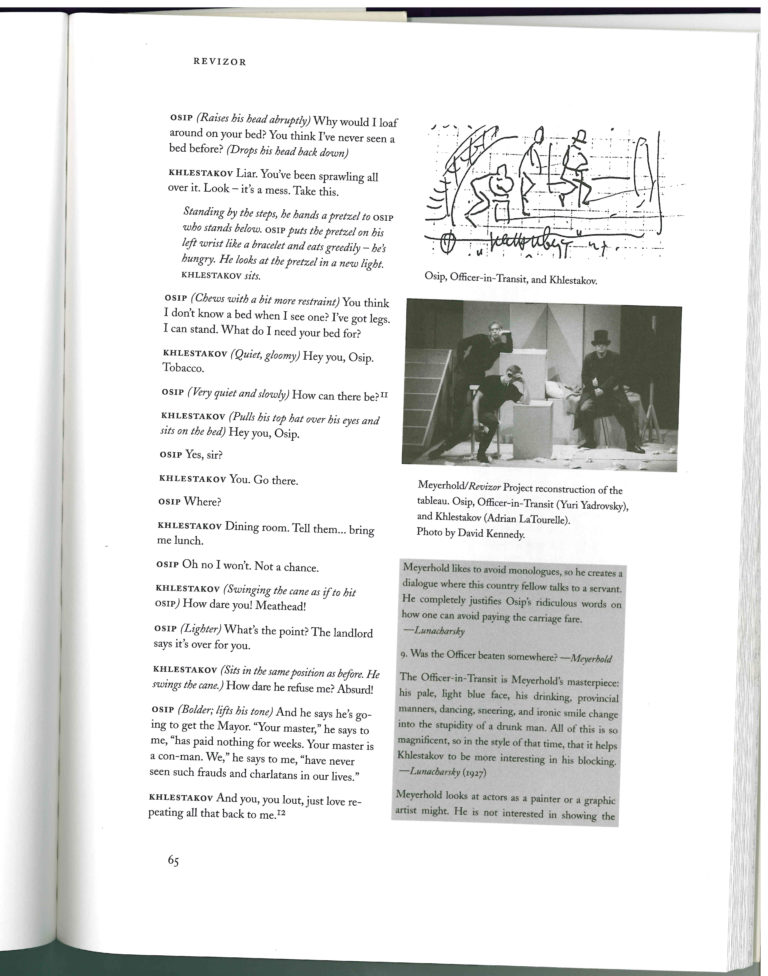
Museum Partners, The Meyerhold Project, and the jazz club D-58
CEC organizes a symposium on the dioxin problems in Russia. 132 people participate in the Third North American-European-Russian Workshop on Joint Actions to Reduce Dioxin and Dioxin-Related Compounds.
New initiative Museum Partners helps build collaborative relationships between museums and libraries in the US and Russia (through 2009).
The Meyerhold Project brings graduate students of St. Petersburg Drama Academy to Yale Drama School to stage Gogol’s Inspector General.
In collaboration with the Gertrude Stein Repertory Theater, CEC organizes an early theater video-symposium on Biomechanics that includes Russian participants via the internet.
In celebration of the anniversary of D-58, the first jazz club in the USSR, CEC brings the legendary jazz pianist Billy Taylor to the Jazz Festival in St. Petersburg.
Supporting museum professionals, artists, and musicians. Introducing US contemporary music to Russian audiences.
CEC hosts Content / Interpretation / Presentation, a seminar for museum information specialists on museum labeling, and brings speakers to The Andy Warhol Symposium at The State Hermitage Museum in in St. Petersburg, Russia.
CEC inaugurates public programs in New York City with the project go_HOME that chronicles online the residencies in NYC of two artists from ex- Yugoslavia.
CEC provides support for the international conference Responsibility of Intellectuals: Art, Ideology, Memory in the 20th Century.
CEC introduces US contemporary music to Russian audiences with performances and workshops by innovative musicians and composers, including Phillip Glass, Terry Riley, Meredith Monk, Bang on a Can, So Percussion, Pauline Oliveros, Shelley Hirsch, ETHEL, and Rhys Chatham (2002-2006).
CEC supports the participation of US musicians in the St. Petersburg International Early Music Festival.
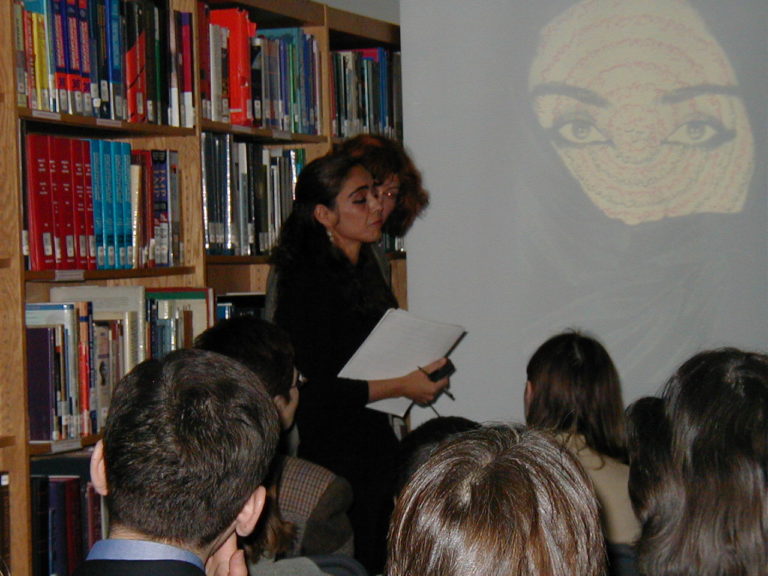
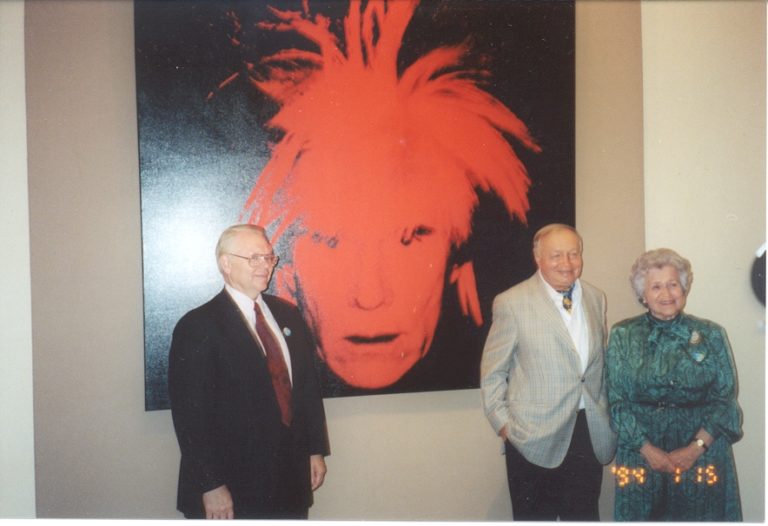
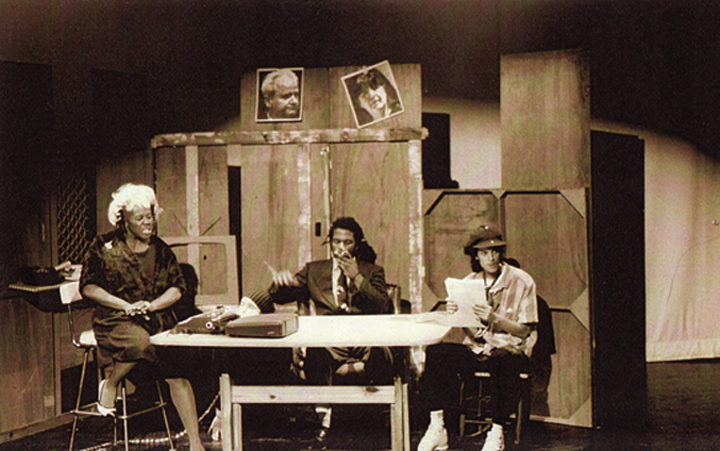
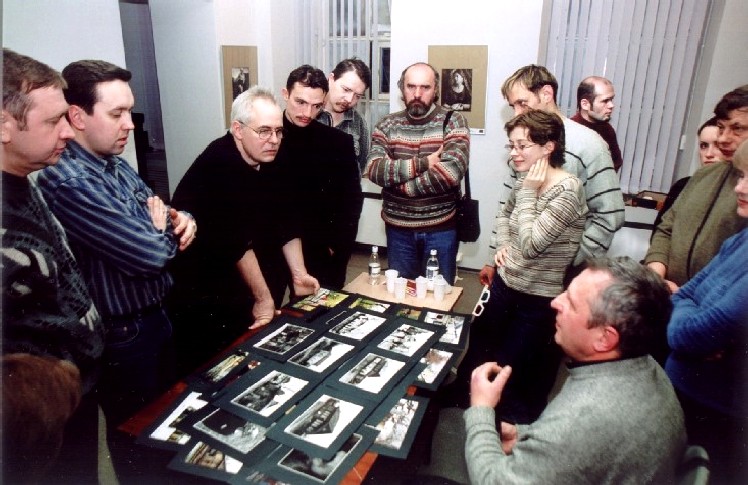
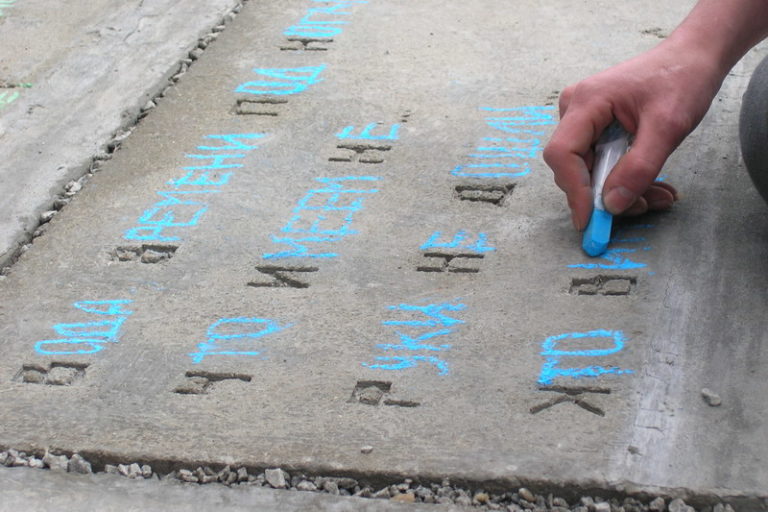
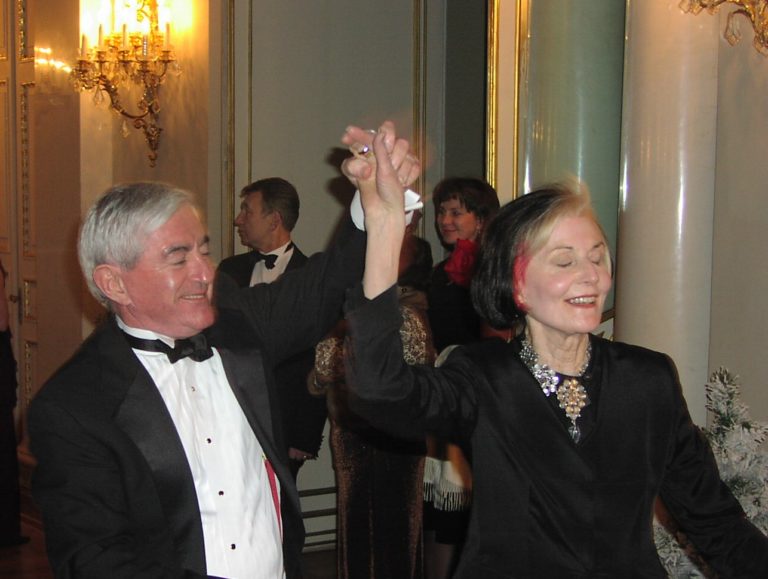
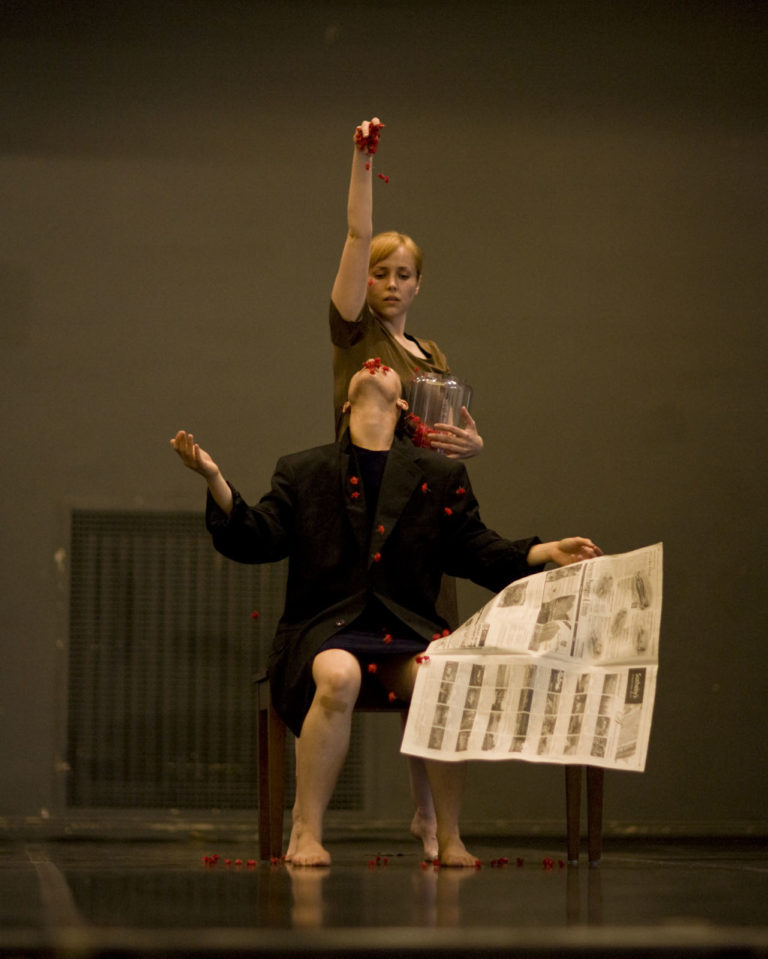
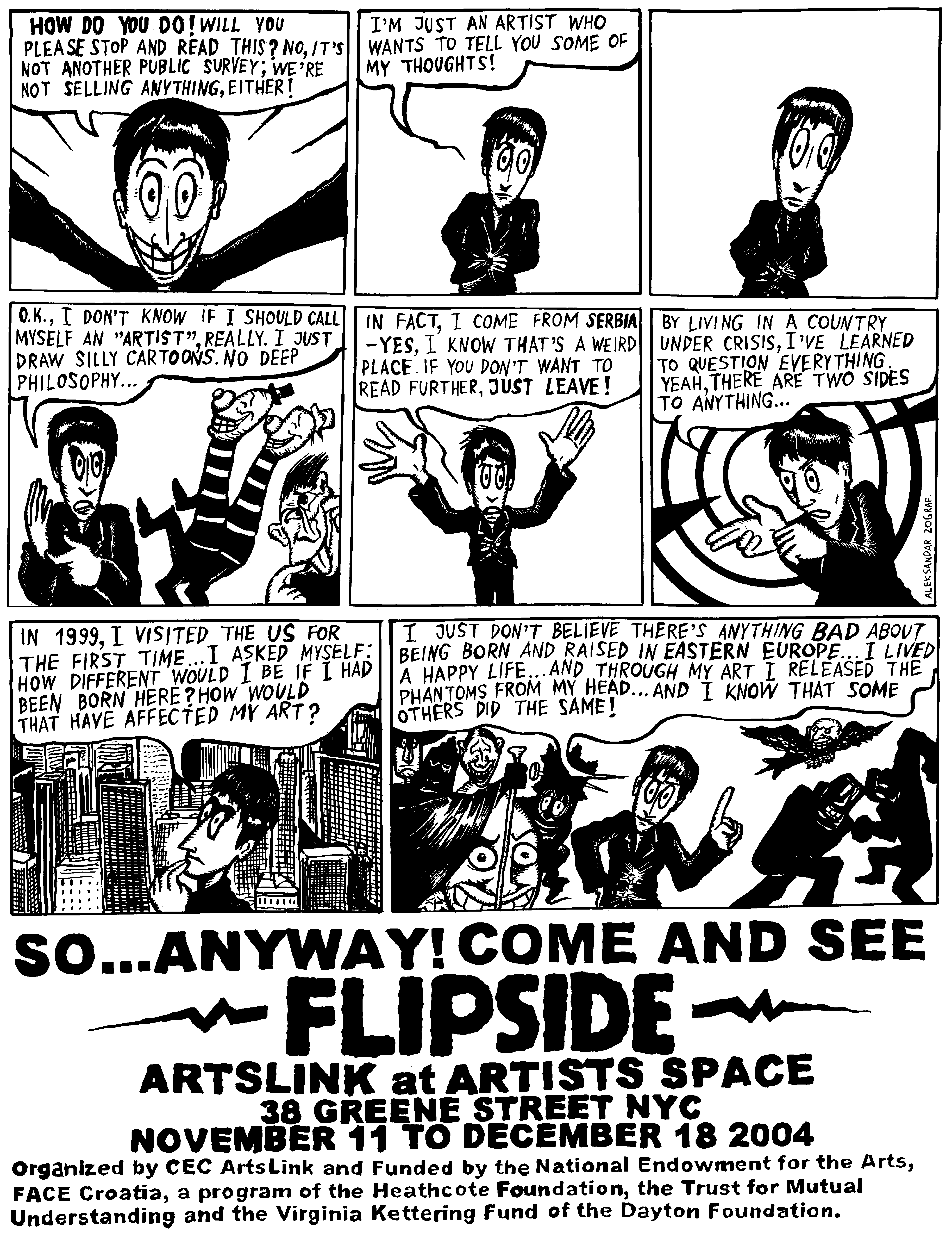
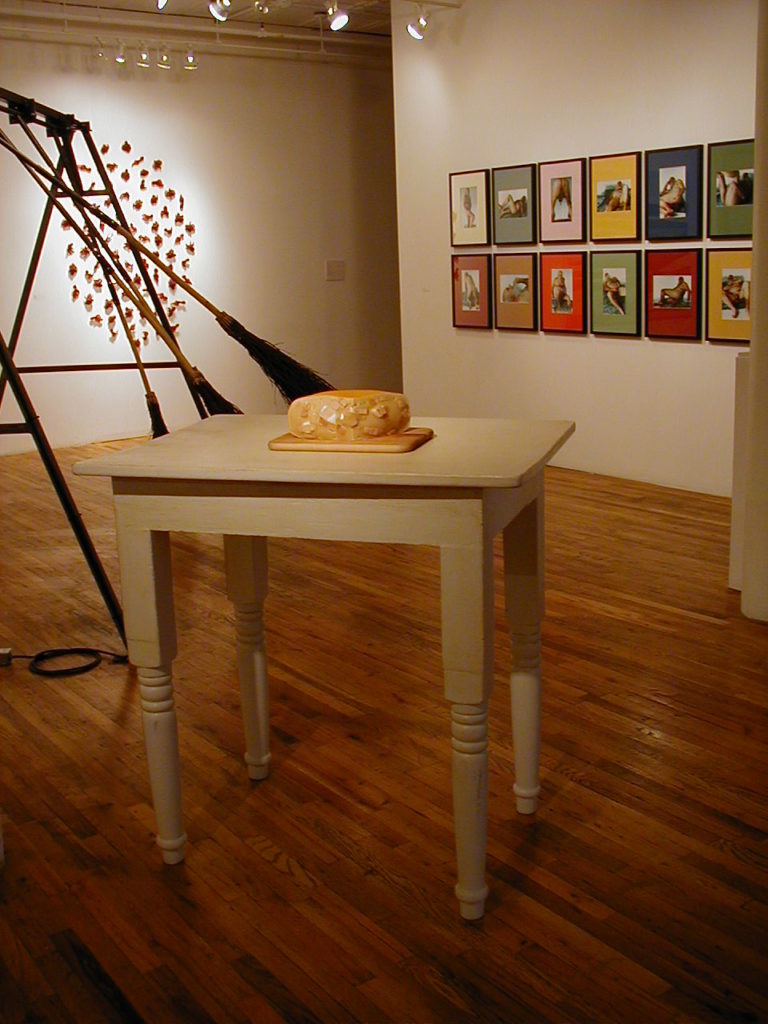
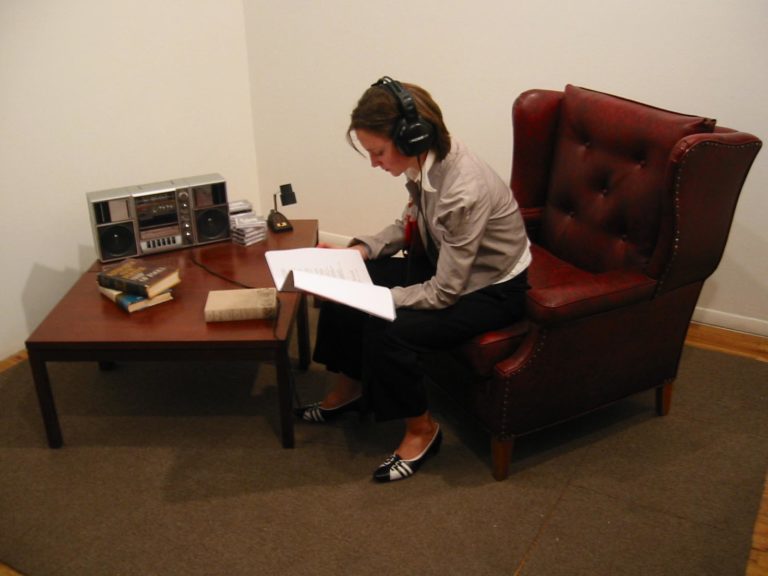
The Jubilee Fellows, VisArt, Open World Cultural Leaders, Flipside, and a collaboration with Bang on a Can
CEC focuses exclusively on the arts and chooses a new name, CEC ArtsLink.
In honor of St. Petersburg’s tercentenary CEC launches new exchange The Jubilee Fellows (now Art Prospect Network Fellows) which offers residencies at US arts organizations for rising arts managers from Russia.
St. Petersburg 2003 is renamed VisArt and continues programming that responds to current artistic and cultural issues in Russia and Central Asia through professional development residencies.
The Library of Congress chooses CEC to implement Open World Cultural Leaders program. 300 literature, film, theater, dance, and musical artists from Russia come to the US for professional residencies with institutions like Sundance Film Festival, Jacob’s Pillow and PEN World Voices. Program runs for 8 years.
The President of the Russian Federation awards CEC ArtsLink the medal “In commemoration of St. Petersburg’s 300th Anniversary”.
CEC ArtsLink produces Flipside, an exhibition of work by ArtsLink awardees at Artists Space in NYC.
CEC ArtsLink begins an ongoing collaboration with Bang on a Can, which brings the US contemporary music ensemble to Russia, Uzbekistan, and Kyrgyzstan and Central Asian musicians to the Contemporary Music Summer Institute at Mass MoCA.
FlipFest! and Global Art Lab
President Michael Brainerd retires. Fritzie Brown, Director of the ArtsLink Awards program, is chosen to lead the organization.
As a follow-up to Flipside exhibition, CEC ArtsLink produces FlipFest! to celebrate diaspora culture and fusion with an evening of diverse performances by artists from around the world at Angel Orensanz Center in NYC.
Inaugural Global Art Lab exchange of US and Central Asian visual artists creating socially engaged projects.
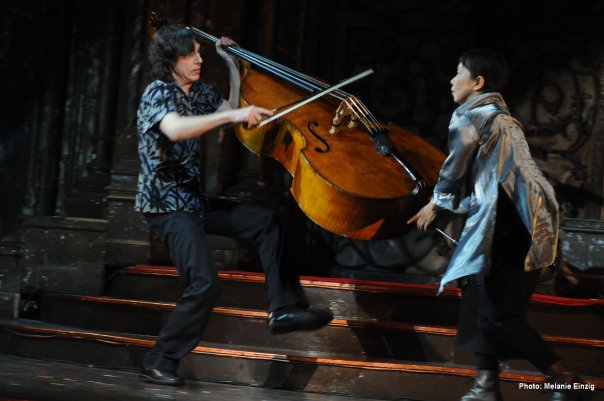
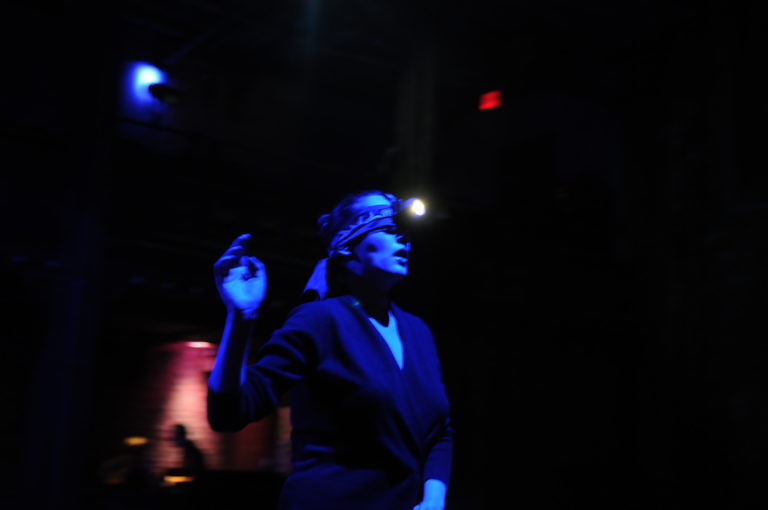
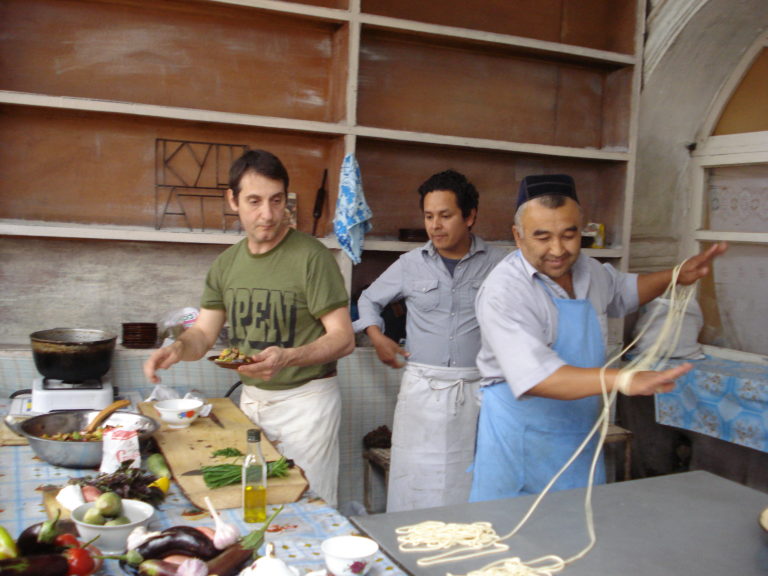
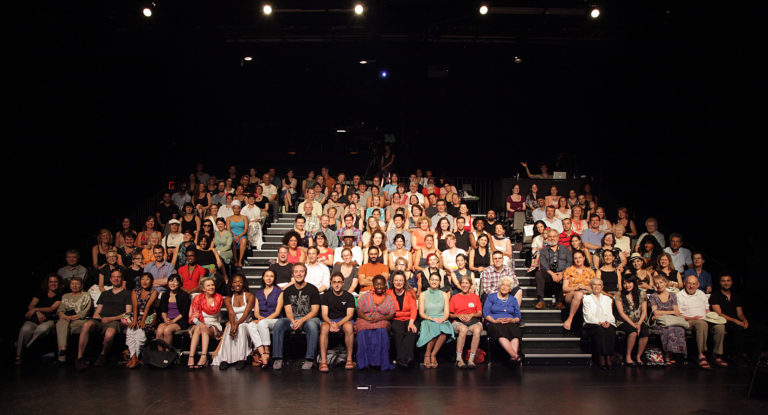
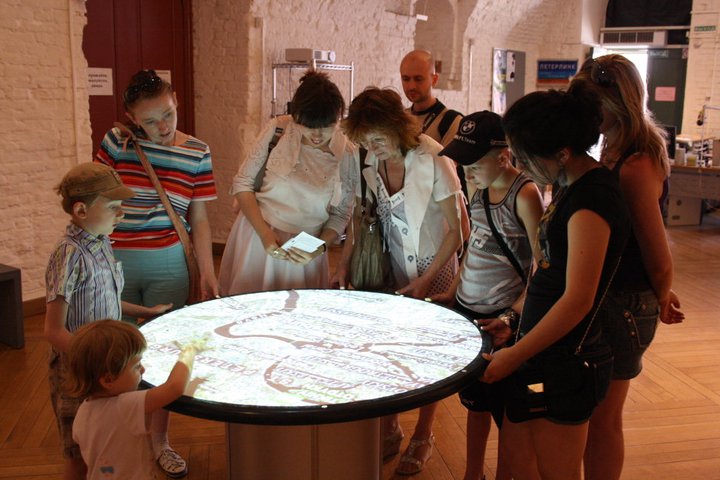
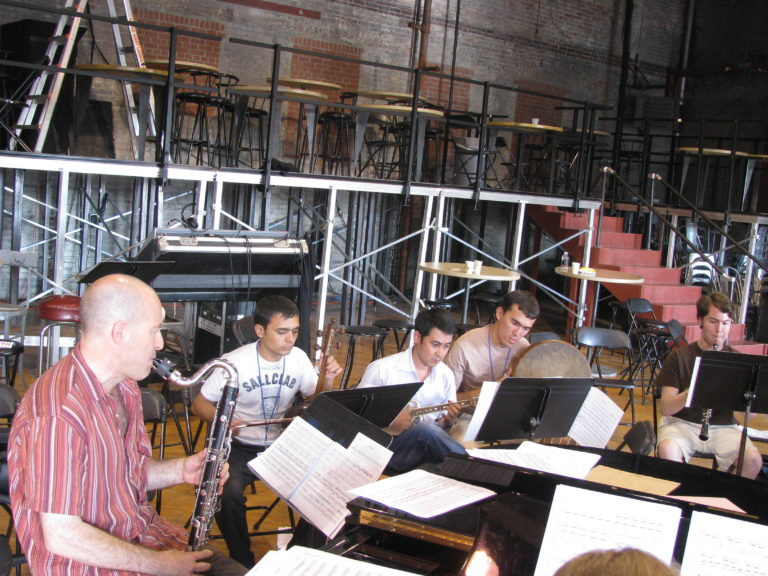
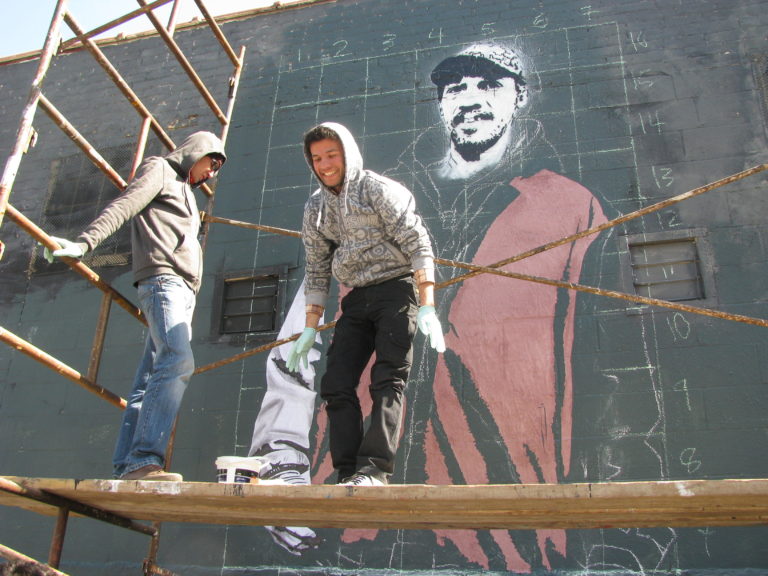
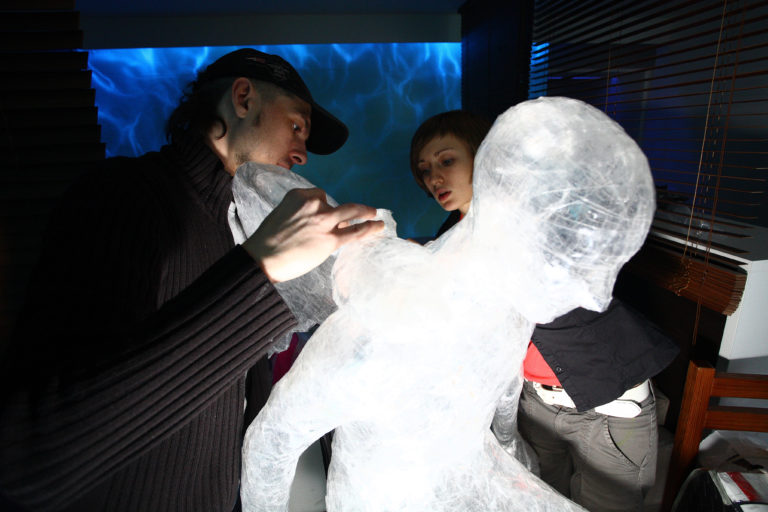
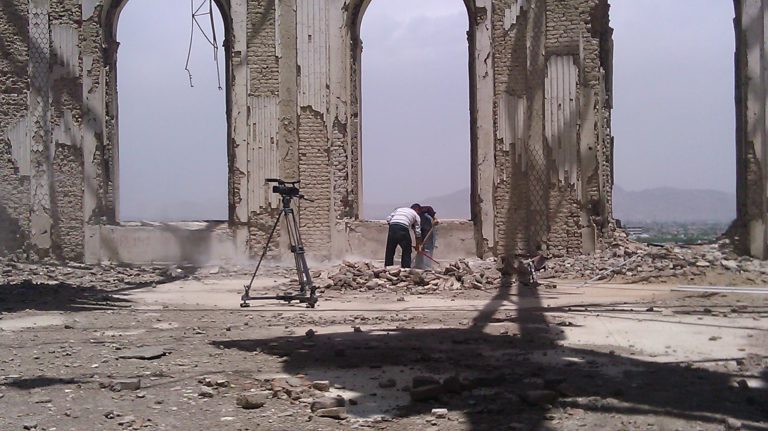
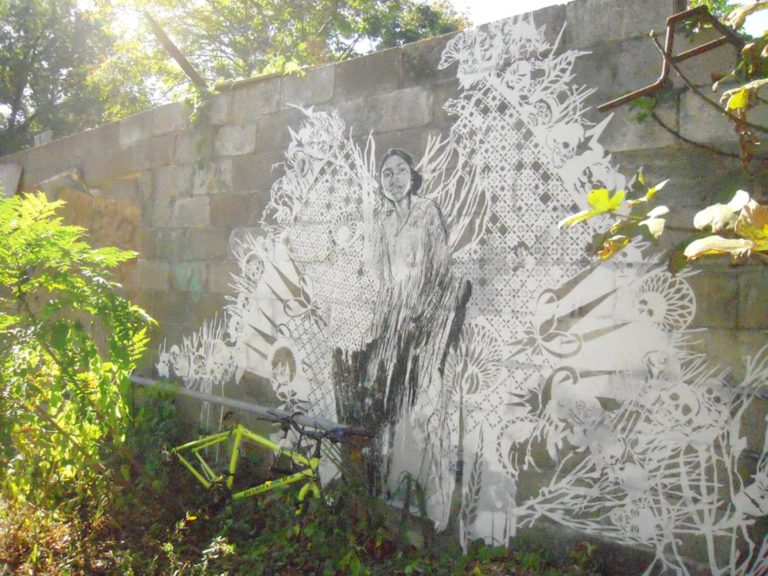
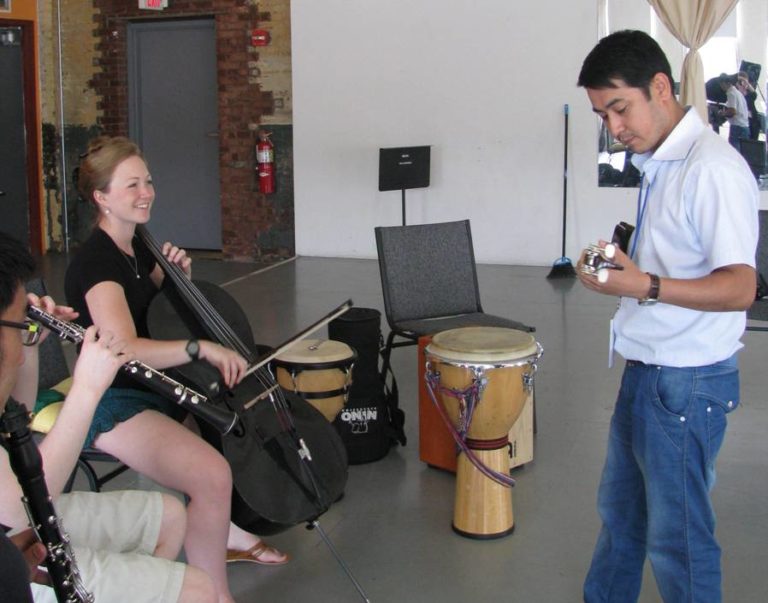
Art Prospect, One Big City, and American Traditional Music Festival
ArtsLink Awards expands to include Afghanistan, Egypt, Israel, Lebanon, Palestine, Syria, and Turkey.
CEC ArtsLink produces Publicly Creative, a workshop for artists on the practice of public art in NYC.
In collaboration with the American Folklife Center of the Library of Congress, CEC ArtsLink organizes American Traditional Music Festival, a series of concerts in 10 cities across Russia by eight US traditional music ensembles and performers: Balfa Toujours, R. Carlos Nakai Trio, Jeffrey Broussard, Wylie and the Wild West, the Brotherhood Singers, Quebe Sisters, Guy Davis, Phil Wiggins Samuel James, and the Texmaniacs (2012-2013).
Launch of the annual international public art festival Art Prospect in St. Petersburg, Russia to engage local communities through the arts and transform public spaces.
CEC ArtsLink produces One Big City, a two year project to engage New York City’s diaspora communities through collaborations with local artists and the artists from the countries whose émigré populations contribute to New York’s unique makeup. One Big City pares artists from Russia, Thailand, Brazil, Croatia, Georgia and Czech Republic with established African-American, Puerto Rican, and Kazakh artists living in New York.
New initiatives in Art Prospect Network countries, Playing Together, and Back Apartment Residencies
Art Prospect Festival expands its geographic scope with Festivals in Azerbaijan, Georgia, Kyrgyzstan, and Ukraine. New initiatives Art Prospect Network, Residencies, and Fellowships support artists, cultural organizations, and communities in Armenia, Azerbaijan, Belarus, Georgia, Kazakhstan, Kyrgyzstan, Moldova, Russia, Tajikistan, Ukraine, and Uzbekistan.
With the support of the US State Department, CEC ArtsLink organizes collaborative concert tours Playing Together and produces a CD of original music with US and Central Asian musicians in all 5 Central Asian countries. The project in 2016 marks the 25th year anniversary of the independence of the Central Asian countries and celebrates US-Central Asian cooperation with concerts of original music heard by thousands of people in Almaty, Ashgabat, Tashkent, Astana, Bishkek, and Dushanbe.
New program, Back Apartment Residencies provides professional residencies for US and international artists and curators in St. Petersburg, Russia.
Executive Director Fritzie Brown retires. Simon Dove, a curator and educator, is chosen to lead CEC ArtsLink.
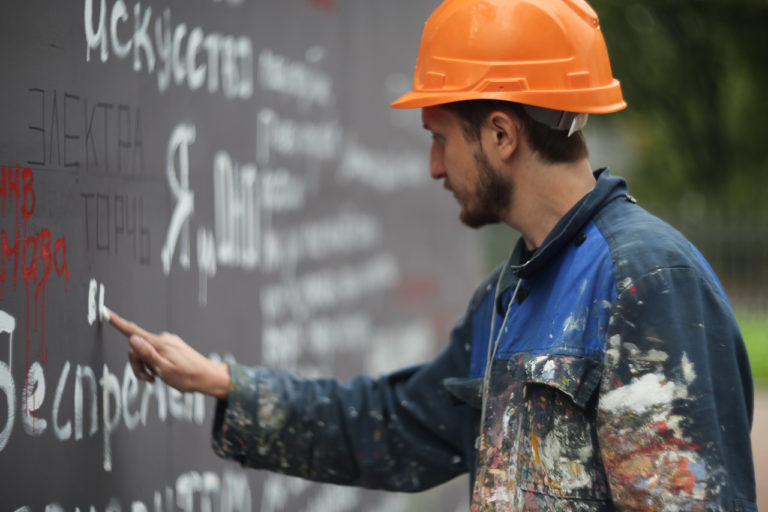
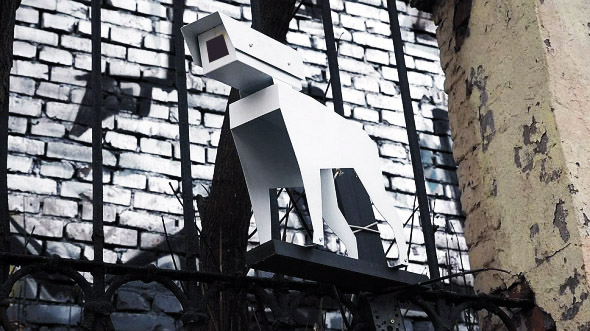
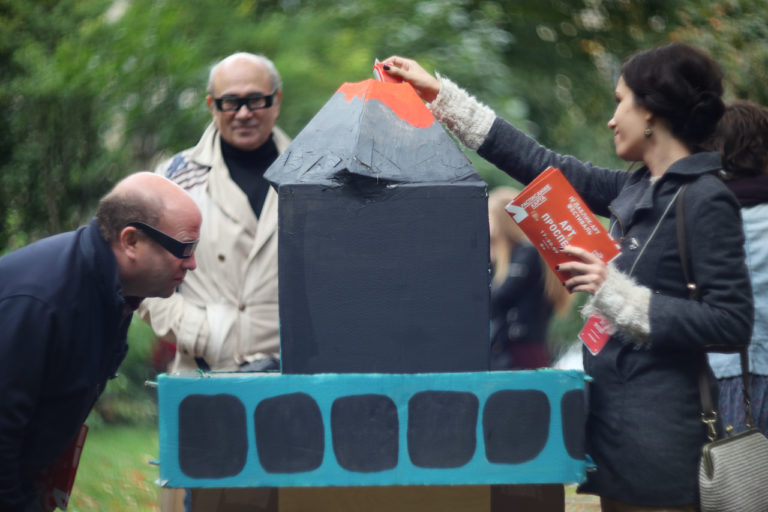
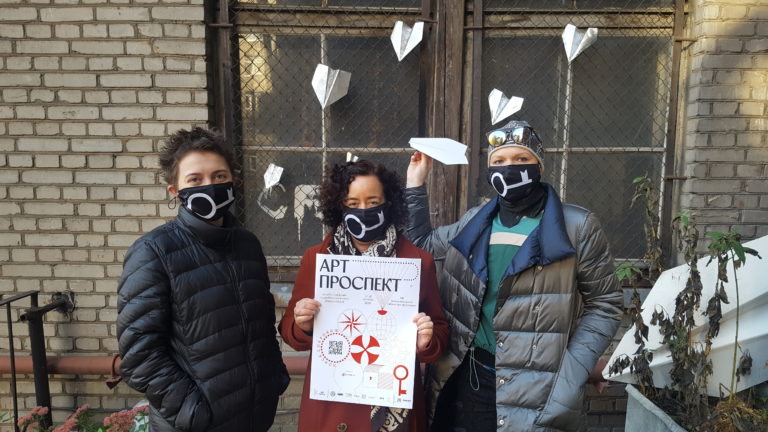
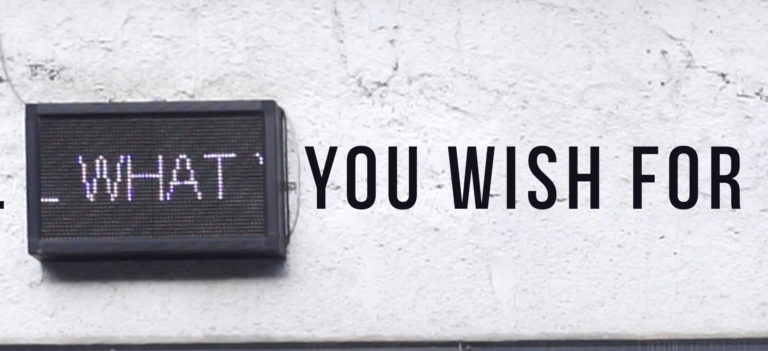
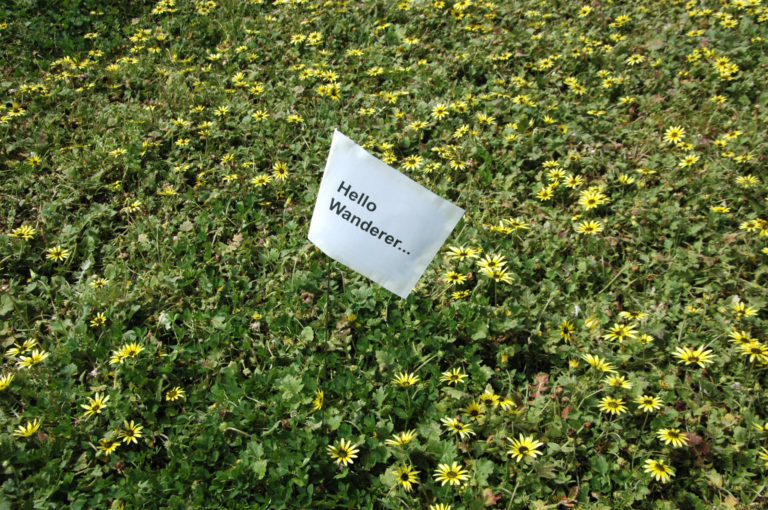
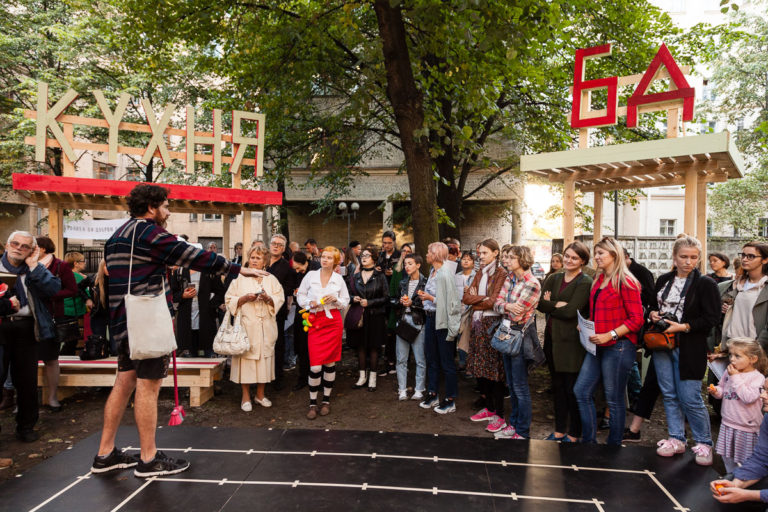
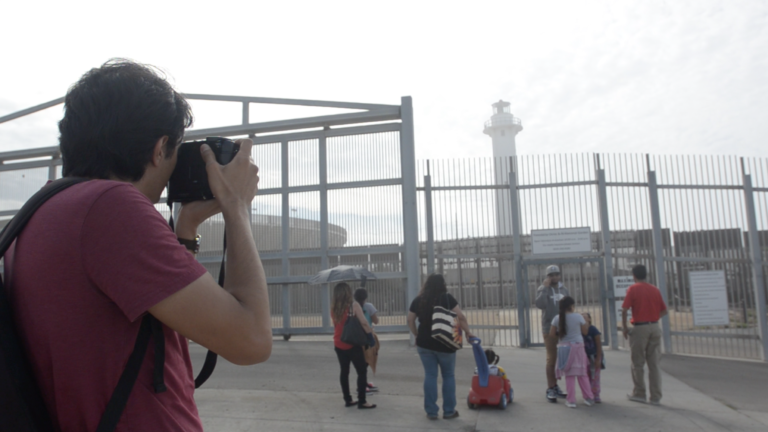
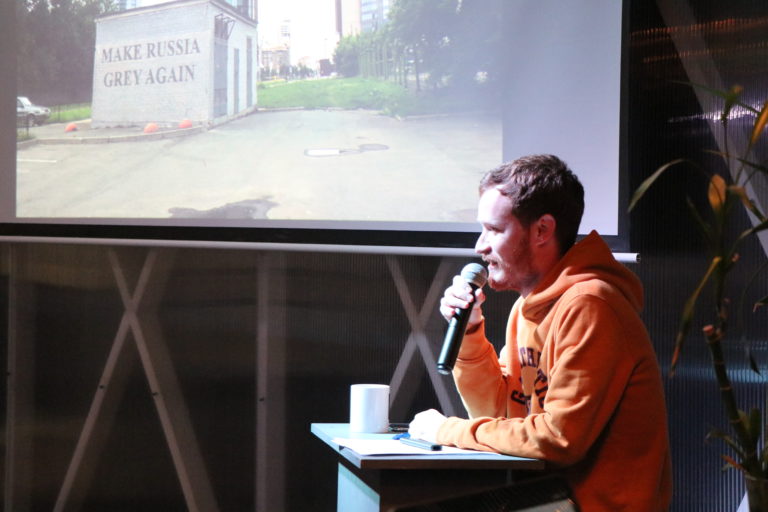
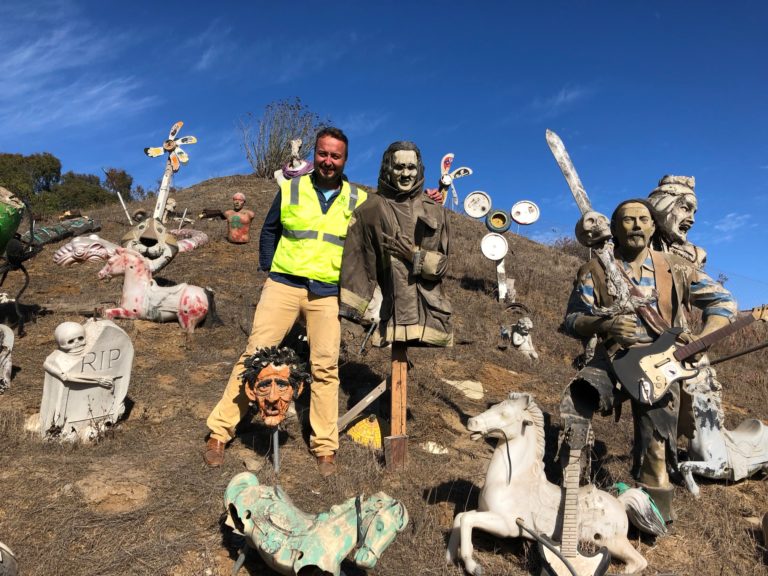
ArtsLink Assembly, ArtsLink International Fellowships, and ArtsLink Index
New initiative, ArtsLink Assembly, annually convenes transnational artists, thinkers, and activists working with culture to create a better world.
ArtsLink International Fellowships replace ArtsLink Awards with a multi-year program of Residencies in the US and follow up projects to support transnational artists and arts leaders in developing community engaged practices in the US and around the world.
During the pandemic year, CEC ArtsLink focusses on supporting artists, curators, and arts leaders in its network countries and the US with virtual residencies, programs, stipends, and networking opportunities.
Art Prospect Festival 2020: Treasure Hunt expands online commissioning 50 artists in 25 cities across 13 countries.
ArtsLink Assembly 2020: Radical Hospitality, is entirely online over 5 weeks, livestreaming to audiences in 36 countries and across 38 states in the US.
In 2021, CEC ArtsLink publishes new website with extensive video archives and resources and launches the ArtsLink Index – a publicly searchable database of over 1,800 artists, curators, arts leaders and organizations in the CEC ArtsLink transnational community.